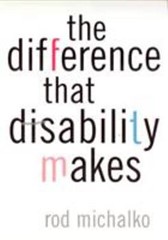
Book review by the Rev. Peter Heide
Michalko begins the difference that disability makes (Temple University Press, Mar 2002) in narrative conversation with a number of observations, ex. noting that throughout history people have put greater value on minerals and substances that are limited. Gold’s value comes from its scarcity; the same is true of diamonds and natural pearls. At one time salt was so valuable that it was used as a means of exchange. Michalko reminds us that salary comes from the practice of Rome paying its soldiers with salt.
Yet, when society regards the relative scarcity of people living with disabilities, the world chooses to devalue their lives thus depriving itself of the gifts that people who live with disability in daily living have to offer their societies and the world. “Therefore, [disability] has nothing to do with the individual. The disabled person is strictly a biological deviation from the normal body.
“…From this, follows [Mike] Oliver’s [social model] understanding of disability. Disability…is all the things that impose restrictions on disabled people, ranging from individual prejudice to institutional discrimination, from inaccessible public buildings to unusable transport systems, from segregated education to excluding work arrangements, and so on.
“…The simulacrum of disability paints it with the brush of misfortune, pity and victimage, yielding a number of contemporary assumptions about disability.” Society presumes the lives of people living with disabilities are perpetual suffering and therefore to be avoided in all circumstances.
The social model of disability does not refute that there is suffering, but it relocates where the suffering takes place. “Suffering then is an essential aspect…, but…we do not suffer the condition of our impairments as medicine and the rest of society would have it. We suffer our society. (emphasis mine) We suffer what our society makes of our impairments and this, according to the social model, is oppressive.”
It is only within the medical model of disability that individuals with a disability are seen as “suffering and incurable and thus unalterable biological conditions”. In turn we are then treated “with pity or even with scorn but [also]…with admiration if we adjust well within non-disabled standards. All with the understanding that, like everyone else, we hate being disabled.
“…Contemporary society understands disability as lack and subsequently treats [disability] as lack, particularly the lack of ability, figuring it within the frame of instrumental relations. The lack of the ability, to see, to hear, or to walk, is framed within the inability to do things that ordinarily and naturally adhere to these abilities.”
When this view of lacking is shifted from the individual to society, the identity of the person who lives with a disability regains personhood and the process of public accommodation can be addressed. Michalko presses the point that when consideration is made for accommodations, it is rarely the disability that influences society’s willingness to make change. It is always cost.
The question throughout this book continues to be how valued and valuable people who live with disability are to the societies they live in. It is past the time for society to think about people living with disabilities and think about the future with them.
There were so many times that, as a blind reader, I wanted to get up and shout, “YES!” Finally, someone is speaking for me.” I highly recommend this book to any who would like a deeper understanding of the difference between the medical (curative) model of disability and the social (accommodations) model of disability. As a church and society, we can only benefit from Michalko’s work and come to appreciate the difference disability makes.
Biography—Rod Michalko is retired. He formerly taught Disability Studies at University of Toronto, OISE, and York University. Some of his other books include:
The Mystery of the Eye and the Shadow of Blindness March 1998
The Two-In-One (Part of the Animals, Culture, and Society Series) December 1998
Rethinking Normalcy: A Disability Studies Reader (with Tanya Titchkosky) May 2009
